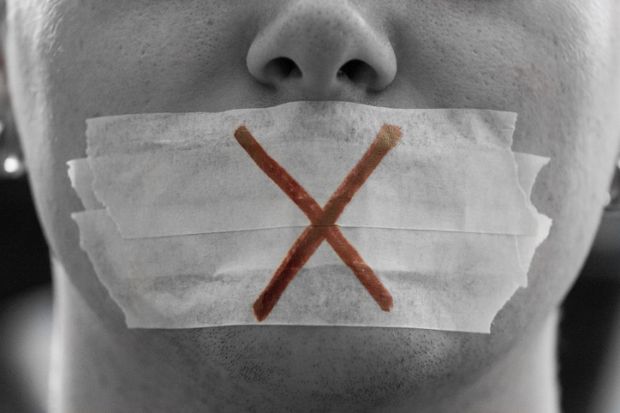Academic freedom in the UK is in a fragile state. It is buffeted and beleaguered by outraged partisans and undermined by interventions or deafening silences from those who should have the responsibility to defend it. Within five weeks recently, one professor resigned because of a barrage of attacks, and another was sacked.
In part, the turbulence of the university environment reflects the climate of incivility fostered by the rise of social media. But there is more to it than that. UK government initiatives, with universities as a principal target, have sought both to legislate against obstructions to free speech and simultaneously to erect barriers against certain views being heard at all. So how do universities find solid ground?
Freedom of expression is one of the key freedoms (article 19) of the Universal Declaration of Human Rights. It is there again (article 10) in the European Convention on Human Rights, incorporated into UK law by the Human Rights Act 1998: “Everyone has the right to freedom of expression. This right shall include the freedom to hold opinions and to receive and impart information and ideas without interference by public authority.”
All of which seems pretty conclusive, even without the “Hillhead amendment” (successfully moved by Lord Hillhead, Roy Jenkins) to the 1988 Education Reform Bill. This requires universities to “ensure that academic staff have freedom within the law to question and test received wisdom, and put forward new ideas and controversial or unpopular opinions”. This required protection is not restricted to teaching and research. As the American Association of University Professors put it back in 1915, academic freedom also covers “freedom of extra-mural utterance and action”. To the extent that that freedom cannot be exercised, the potential role of academics as public intellectuals is reduced.
Since it appears that “public utterance” has played some role in the sacking of David Miller from his sociology chair at the University of Bristol, it is worth looking at what is known about this case. His dismissal followed a barrage of public attacks on him, and also on the university, for not having sacked him more promptly. These included a letter demanding action signed by over 100 MPs and peers. Miller was characterised as an antisemite (or, in the words of Gavin Williamson, when he was secretary of state for education, a racist).
What did he do? The university has provided no charge, no evidence and scant justification for this almost unprecedented penalty. Its statement announcing Miller’s dismissal cites guidance from the arbitration service Acas that “such internal processes should remain confidential”. However, the statement does have this one graspable fact: the “leading QC” the university consulted “found that Professor Miller’s comments did not constitute unlawful speech”. Yet the university sacked him anyhow, citing its “duty of care to all students and the wider university community” and claiming that “Professor Miller did not meet the standards of behaviour we expect from our staff”. There is no more detail than that.
The breach, we must assume, is that he offended the sensibilities of some students. On this basis, of course, no professor (or lecturer, or anyone in between) is safe from dismissal if, based on their academic work, they challenge some students’ received opinions. My own teaching disturbed some students with its non-standard interpretation of the professional environment in which they would shortly be working after graduation. (I know this because I was, on occasion, told so in no uncertain terms.) Yet I would like to think that being in some sense provocative was well within my – unwritten – job specification.
So Bristol’s justification for dismissing David Miller is, frankly, risible. A more credible explanation is that senior management decided that to stop mass public attacks it was necessary to do what the attackers were demanding; mere evidential shortfall should not stand in its way.
Why was David Miller under such attack? It is because his academic field includes the analysis of how powerful networks can influence media representations and, hence, public beliefs – and because one focus of this research has been the projection of narratives favourable to Israel. Perhaps Miller should be grateful for this vivid public validation of his academic analysis. For the demand by those massed parliamentarians and others (such as Bristol’s mayor, who supported the Bristol Jewish Society in its complaints) was preceded by a year in which organisations that include in their remit support for Israel had been campaigning unremittingly for him to be disciplined.
This is an isolated case, in the sense that the sacking of professors is not yet routine. But in another sense it is not. Complaints against academics who express criticisms of Israel, often while teaching or in social media postings, have escalated in the past year and led to disciplinary cases against staff in a whole series of UK universities. This followed the ultimatum to English universities last autumn from Gavin Williamson, when secretary of state, to adopt the IHRA definition of antisemitism in short order.
The compliance of the majority of UK universities with this edict and the silence of their leaders about Miller’s sacking is a betrayal of their most central mission: to defend free enquiry. The French have a phrase for it: la trahison des clercs – and it is hard to believe that Miller will be the last victim.
Jonathan Rosenhead is emeritus professor of operational research at the London School of Economics.
Register to continue
Why register?
- Registration is free and only takes a moment
- Once registered, you can read 3 articles a month
- Sign up for our newsletter
Subscribe
Or subscribe for unlimited access to:
- Unlimited access to news, views, insights & reviews
- Digital editions
- Digital access to THE’s university and college rankings analysis
Already registered or a current subscriber? Login










